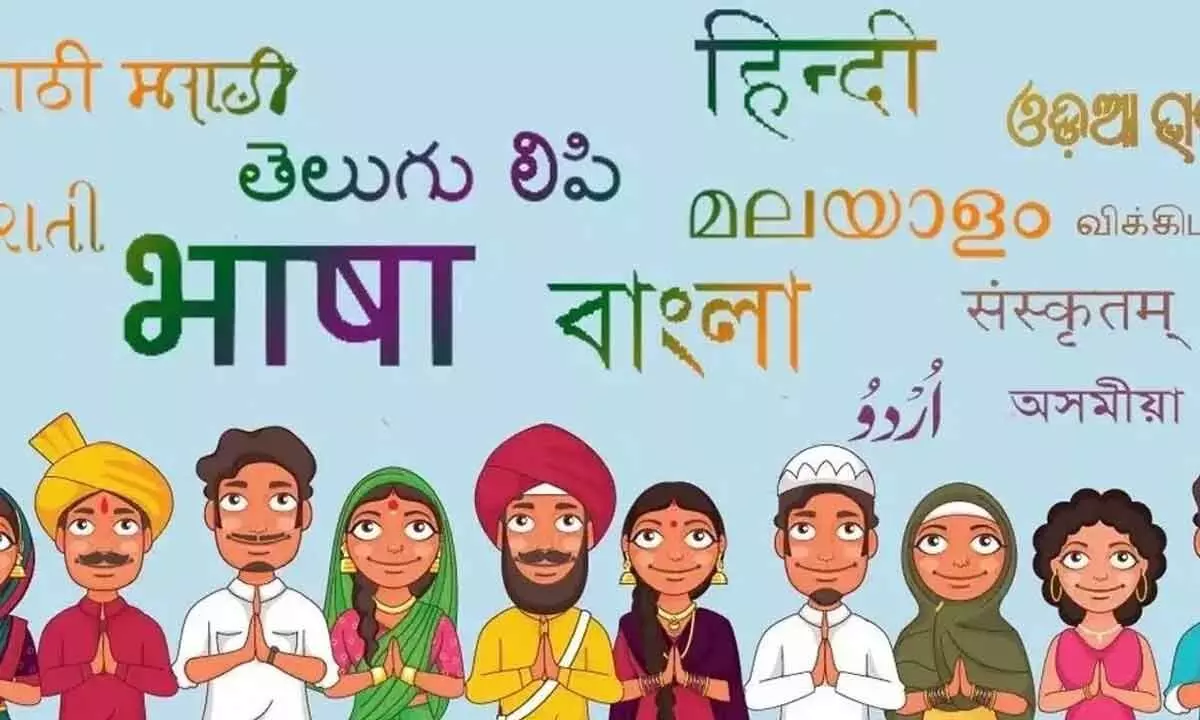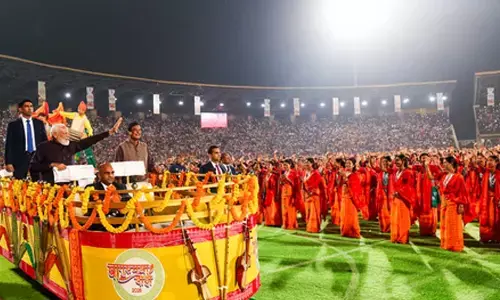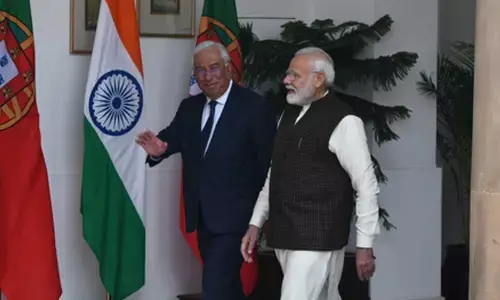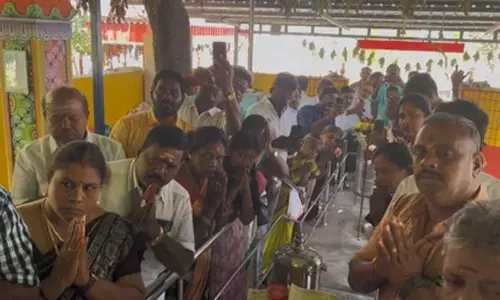Touching a raw nerve avoidable

Quite apart from the content of the Bills – the Bharathiya Nyaya Sanhita Bill, 2023; the Bharatiya Nagarik Suraksha Sanhita Bill 2023 and the Bharatiya Sakshya Bill 2023 – and their intent, one point worth noting is the title of the Bills is in Hindi, although their body is in English. That Hindi is the official language of the country is not in dispute. But Article 348 of the Constitution of India states that the authoritative text of all Acts, passed by Parliament or State Legislatures, shall be in the English language. Thus, the Bills go against the embargo placed by the Constitution. They fail an important test of acceptability
Union Home Minister Amit Shah on August 11 tabled three Bills in the Lok Sabha – the Bharathiya Nyaya Sanhita Bill, 2023; the Bharatiya Nagarik Suraksha Sanhita Bill 2023 and the Bharatiya Sakshya Bill 2023.
The stated intention of the Home Minister was to fulfil one of the five ‘Panchpran’ or pledges taken by Prime Minister Modi before the country on August 15 to end all signs of slavery. The Bills now introduced will replace the Indian Penal Code, the Criminal Procedure Code and the Indian Evidence Act, previously in force and enacted by the British parliament.
The proposed legislations, according to the Ministry of Home Affairs, seek to protect the rights of Indian citizens by providing justice rather than punishment. The laws will, in other words, have precisely the opposite of what the earlier British laws had, as their objectives. The move, the result of four years of consultation, over hundreds of meetings, with the stakeholders concerned, will, according to the Ministry, strengthen the resolve of the government of India, to centre-stage citizens in the national polity.
It is a moot point whether the system will be able to find Hindi substitutes for Greek/Latin phrases, such as res judicata, corpus delicti, in limine, ceteris paribus and mutatis mutandis. And make those substitutes common parlance carrying the same nuances of meaning, especially for legal practitioners and judicial officers across the country.
Quite apart from the content of the Bills, and their intent, one point worth noting is the title of the Bills is in Hindi, although their body is in English. That Hindi is the official language of the country is not in dispute. But Article 348 of the Constitution of India states that the authoritative text of all Acts, passed by Parliament or State Legislatures, shall be in the English language. Thus, the Bills go against the embargo placed by the Constitution. In a very well-informed, and insightful, recent article, in the Hindu, the authors add that the titles are “unfamiliar to, and unpronounceable by more than half the country’s citizens and an overwhelming majority of its legal practitioners,” resulting in the Bills failing an important test of acceptability. To what extent the ambition India cherishes, of being a global player, is consistent with the present move, is a point worth examining.
It can be hardly disputed that one’s mother tongue plays an important role in life. It is the foundation of the effort to understand one’s culture and identity. It is the medium through which emotions are expressed, and a vital part of human connection. It allows people to share thoughts, and ideas, as well as feelings, with others, and helps build societies. But, as has unfortunately been the case in our own country, a language can also create divisions and barriers, and sometimes, lead to protracted struggles for identity.
Just as governments of the present times have done also, rulers in the past also faced similar situations. Let us take, for example, the case of Sri Krishna Devaraya, the Emperor of Vijayanagara Empire and the Third Monarch of the Tulu dynasty. He was the King of a multilingual Kingdom, with Telugu and Kannada being the principal languages apart from Tulu, his mother tongue. He was a great patron of the fine arts, and himself an accomplished writer. His epic Telugu composition, ‘Amuktamalyada’, is regarded as one of the greatest master pieces of Telugu literature. Before embarking on that work, however, he was faced with a serious dilemma, of a political nature, as regards the language in which it was to be written. When he chose Telugu, he began the poem by stating that Lord Andhra Maha Vishnu, whose temple is located in Srikakulam village of Krishna district of the Telugu speaking region of the Kingdom, had appeared to him in a dream, and said that, as He was a Telugu deity, and as it was the best among Indian languages, Telugu was the right choice as a language for the work.
Languages are an integral part of culture, synonymous with the identity of the states and their people. They are, therefore, a sensitive and emotive issue and have, on several occasions in the past, led to protests and violent movements. It is, therefore, essential that nothing should be done, which will give room for a suspicion, on the part of the minorities, that the language of the majority is being imposed on them.
Those, at the highest echelons of the governance apparatus, have an onerous task ahead of them. They are charged with the responsibility of ensuring sustainable development, and rapid growth, of the country. It is, therefore, essential that they recognize, and respect, the sentiments of people belonging to different cultures, and speaking different languages. The message should go out, loud and clear, that numbers do not matter, and that the interests of all will be protected.
I, myself, have, for long, been closely associated with several languages. Although Telugu is my mother tongue, Tamil was the language I grew up with, having been born in Chennai (then Madras), and spent my first nine years there. To this day, I can converse freely in that language, although the accent, and the idiom, which I use, are more of the coarse metropolitan variety, of Chennai, rather than the chaste version, spoken in the Southern part of Tamil Nadu state.
I also have a smattering of Punjabi, and have acquired a fair degree of fluency in Urdu, at least the Hyderabadi variety. English and Hindi, naturally, are part of my linguistic repertoire. After my education, and before joining the administrative service, I took a couple of elementary courses, in French and German, which I can now read, speak and write, although l can only converse freely with those who have taken the same lessons!
Practice of law being far more lucrative than sitting on the bench, it is often seen that successful lawyers rarely opt for elevation. Which is probably why a story is very popular, especially in the Konaseema area of East Godavari district, of Andhra Pradesh state, to which I belong, known for its cantankerous and litigious public.
A magistrate hearing a case found that the defence Counsel was absent, in his Court, when the case came up for hearing. Upon enquiry, the defendant said that his lawyer was arguing in another Court and would make an appearance shortly. The irritated magistrate remarked, “go find another one. After all, lawyers are available even for four annas (a fourth of today’s rupee).” The client ran to his lawyer and informed him accordingly. The client’s lawyer shot back, saying, “go tell that magistrate, that all lawyers available for four annas, are serving as magistrates!”
Courts of law, and the proceedings that take place in them, have, for long, fascinated authors and movie makers. Well-known authors, such as Henry Cecil and John Grisham, have produced brilliant works, crafted in a masterful manner, describing the drama that takes place in Courts of law. The plots weave together the threads of each story into a compelling, and heart pounding, tale, truly masterpieces of the art of writing.
Many unforgettable movies have also been produced, in English, Hindi and in other Indian languages, portraying, in a forceful manner, the intensity, and tension, of Courtroom drama. Notable among these are the unforgettable English film, ‘To Kill a Mockingbird’, the yesteryear Hindi runaway thriller ‘Kanoon’, and the classic black and white Telugu movie that brilliantly captured essence of court room suspense, laced with occasional humour, ‘Manchi Manasulu’.
In the context of this discussion it may be pertinent to note that not all that was brought, to us by the so-called invaders of our country, was, after all, bad. The Moghuls and the British left us with many lasting, and immensely useful, traditions and systems. Surely, no one is suggesting, for example, that cricket, and Hyderabadi biryani, should be banished from the country, on the ground that they represent colonial legacies!
To end this rather dry piece on a lighter note, here is a story I heard about my father, Bhimasankaram, who was a Judge of the (then) Andhra Pradesh High Court, in the late 1950s. He was known to be somewhat impatient, and even prone to be curt, when needlessly lengthy averments were made by counsels appearing in his court. So much so that, when a new entrant to the bar asked a senior lawyer, who it was that was arguing so loudly in one of the courts in the High Court, the elderly lawyer replied, “it is Justice Bhimasankaram arguing for both sides!”
(The writer is formerly Chief Secretary, Government of Andhra Pradesh)














